
When Voices from Ukraine Become Essential to Holos Ameryky Radio Broadcasts
 |
Reporting for VOA in Newly Independent Ukraine
When Voices from Ukraine Become Essential to Holos Ameryky Radio Broadcasts |
![]()

By Adrian
Karmazyn
This year,
Over the course of that spring, I would file a report roughly every day that
would highlight some significant, unique or underreported aspect of Ukrainian
politics, foreign relations, economics, culture or social life. That approach
would, hopefully, help listeners better understand the situation in their own
country, within a global context and as seen from the perspective of an
American journalist. As any
reporter knows, covering a given topic can raise societal awareness about that
issue. Thanks to VOA’s longstanding
reputation as a respected and trustworthy news organization, when Holos
Ameryky spoke, people genuinely listened. Therefore, we tried to approach
our story selection very responsibly.

My parliamentary press pass.
So, what did I
report on in the spring of 1993? Below, based on the scripts I have in my
collection, I will share highlights from that eventful and extraordinary 90-day
assignment as a radio correspondent in
FOREIGN
RELATIONS
U.S. high-level engagement with Ukraine was quite vibrant during those months
as exemplified by the visits to Kyiv of Secretary of Defense Les Aspin,
Ambassador-at-Large and Special
Adviser to the Secretary of State on the New Independent States Strobe
Talbott, former National Security Advisor Zbigniew Brzezinski, and a high-level
Congressional Delegation which included Representatives Richard Gephardt, Bob
Michel, David Bonior, David Obey, Steny Hoyer and Newt Gingrich. House Majority
Leader Gephardt told reporters that “our purpose is, first, to say to the
Ukrainians that we think their country is very important to the region and the
world… And we wish them well in
their desire to have democracy and market reforms.”
He expressed hope that Ukraine would ratify the START Treaty and
emphasized that the delegation was making this visit in order to “be a
constructive partner with President Clinton” in putting together a new aid
program for this part of the world.
At the time, eliminating the nuclear weapons that


Congressional leaders Richard Gephardt (D) and Bob Michel (R).
In his opening remarks at a meeting at the Verkhovna Rada on April 5th,
Gephardt underscored
Coming on the
heels of the Congressional delegation meetings with Ukrainian leaders, Deputy
Foreign Minister Borys Tarasyuk characterized a Russian proposal to take
complete jurisdiction over the nuclear weapons on Ukrainian territory as a ploy
designed to place Russian forces on Ukrainian territory. “
Former U.S. National Security Advisor and one of
Brzezinski noted that
Among the other high-level visits to
It’s important to keep in mind that in March of 1993
In their
presentations, most Ukrainian ambassadors characterized foreign countries and
their peoples as having a positive attitude towards Ukraine and an interest in
developing cooperation at various levels.
The glaring exception was the statement of Ukraine’s Ambassador to
Russia, Volodymyr Kryzhanivsky, who said: “I must tell you candidly that, in
principle, we see that Russia is the only country with which Ukraine
continuously has conflicts. I would say
that no other Ukrainian ambassador works in a country with which there is
discord across the entire spectrum of issues.”
The dynamism of Ukraine’s new international engagement was particularly
apparent on April 15, 1993, when President Leonid Kravchuk was visiting Minsk,
Parliamentary Speaker Ivan Pliushch was in China and Prime Minister Leonid
Kuchma was traveling in the Middle East. And within days, Foreign Minister
Anatoliy Zlenko would be meeting with the Italian president in Rome and Pope
John Paul II in the Vatican. In a VOA interview, the foreign ministry press
spokesperson, Yuriy Sergeyev, explained the importance of these visits for
Ukraine’s trade, energy and other priorities.
(Years later Mr. Sergeyev would rise to the post of Ukraine’s Ambassador
to the United Nations).
NATIONAL
POLITICS
At the time, the dominant themes In Ukrainian national politics were the
difficult economic situation, hyperinflation and a steep decline in GDP, all
within the context of the inability of President Kravchuk, Prime Minister
Kuchma and parliament to reach consensus on a path forward.
The political gridlock and “old guard” dominance made it impossible to
adopt critically-needed economic reforms.
My reporting included the comments of various members of parliament
(MPs) representing various parties, including Mykhailo Horyn, Viacheslav
Chornovil, Les Taniuk, Valeriy Ivasiuk, Serhiy Soboliev, Oleksandr Barabash and
Vasyl Stepenko. Another important official at the time was the Vice Prime
Minister for Economic Reform, Viktor Pynzenyk, who warned of dire consequences
without more decisive support for reforms from the parliament.

Interviewing MP Les Taniuk
at the Verkhovna Rada.
Another big national story was the 7th anniversary of the Chornobyl
catastrophe. Hanna Tsvetkova and Andriy Pleskonis of Greenpeace Ukraine talked
to me about their work in opposition to nuclear power in Ukraine and in keeping
people’s attention fixed on its dangers.
During a demonstration, Greenpeace unfurled a banner on Independence
Square (Maidan Nezalezhnosti) that read: “Chornobyl stopped time. Time
to stop Chornobyls.” The 1986
disaster and its aftermath had mobilized Ukrainian political activism and
contributed to the push for independence. Greenpeace
Ukraine reflected that spirit of participatory democracy.
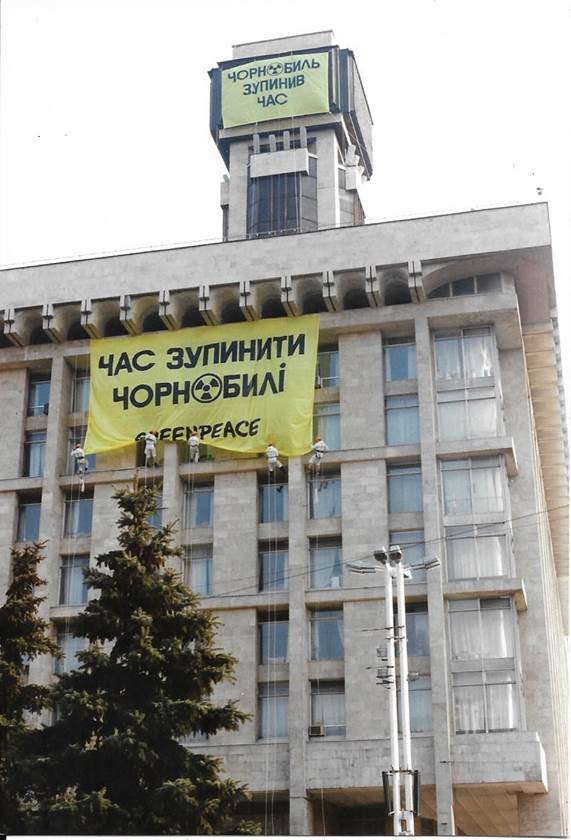
MAYOR OF
KHARKIV
Besides
covering events and personalities in the Ukrainian capital, I felt it was
imperative to travel outside of Kyiv so that VOA could broaden the diversity of
opinion and viewpoints offered in our radio broadcasts, hopefully, leading to a
more enlightening listening experience for our audience.
At the time, I
considered my interview with Yevhen Kushnariov, the mayor of Kharkiv, to be
groundbreaking in terms of enhancing our Kyiv-centric programming with a
prominent voice from Ukraine’s industrial east.
Describing some of the challenges he faced, Kushnariov said: “Kharkiv is a very
big city, it’s the number two city in terms of population and number one in
terms of its industrial and scientific potential.
That is why Ukraine’s economic problems -- against the backdrop of the
economic crisis – have a very noticeable impact here in Kharkiv.
The main problem is for our economy to work normally.
Because if the very big enterprises in Kharkiv which are feeling huge
stress, first of all, due to problems with relations with Russia – if these
enterprises start cutting the number of workers and they end up on the
street—this will be a very big problem for the local government.”
In response, the city was providing assistance to factories to find new
partners and was starting the process of removing these enterprises from
government control, said the mayor.
Kharkiv also faced the problem of a huge budget deficit impacting the
city’s development.
Mayor Kushanariov was skeptical that Polish-style radical reforms could work in
Kharkiv, emphasizing that Poland had the help of two influential and
authoritative institutions -- the Solidarity movement and the Church – which
helped maintain social cohesion and peace: “These two forces were able to
restrain society from any unpredictable
events, which can arise when a large number of people experience a worsening of
their standard of living. This is
why measures that cause pain, at this point, are not possible in Ukraine. You
need to keep in mind the mentality of Ukrainians that live on this side of the
Dnipro in eastern Ukraine.”
Despite his skepticism regarding the privatization of large enterprises,
Kushnariov lamented the slow pace of small-scale privatizations, as he viewed
small businesses as a very promising sector for economic growth.
The parliament’s preference for long-term leases of communal property
rather than genuine privatization was tying the hands of local governments and
hurting the entrepreneurial spirit of small businesspersons, he said.
LVIV
PRIVATIZATION
On May 15, 1993, Lviv held its second privatization auction, with disappointing
results. Only three of seven
communal sites placed on auction were sold -- two food establishments and a
laundry facility -- bringing the total number of privatizations in the city to
20. Although local authorities tried to be optimistic, two shop owners who
participated in the first privatization auction complained that hurdles to
success were disheartening. Mariya
Vlasiuk, a co-owner of the Yardan café, exuded entrepreneurial pride in
providing tasty food and drink to her customers but complained of excessive
amounts of paperwork in the process and the difficulty of covering the costs of
the purchase of the business with her very limited earnings. Meanwhile, Iryna
Yasnyska, owner of the Premier household goods shop, took pride in being a
pioneer in privatization efforts but complained that it’s difficult to fill her
shelves with goods since practically all enterprises are state-owned and won’t
sell to her. Plus, she viewed
government price controls that were instituted at the time as unfair and
contrary to market principles.
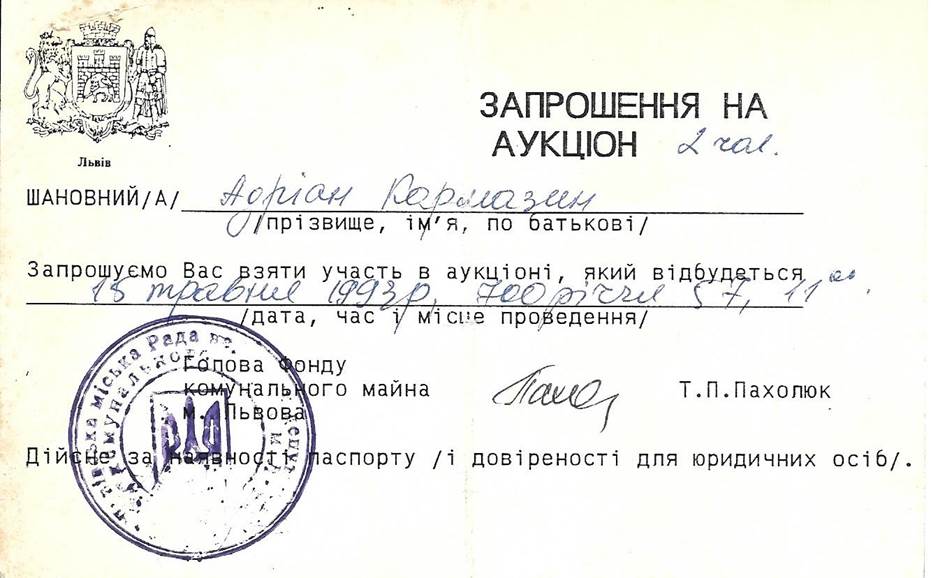
My invitation to a privatization auction in Lviv.
GENERATIONAL
SHIFT
As in many countries, generational differences in outlook and expectations
were quite apparent in Ukraine in 1993.
During my
visit to Kharkiv, I spoke with a group of students at the Karazin national
university, who shared their views about the situation in Ukraine and,
according to most, the need for rapidly jettisoning Soviet practices and
symbols.
The most patient among those I met was Dmytro Kolomayets, who said: “Really,
changes are happening although not very quickly, but perhaps they should not be
done too swiftly. It seems to me
that Mr. Kravchuk, our president, is a proponent of not changing things too
quickly so that they are not too painful for our people.
I think he is correct. We
don’t need to break everything… Perhaps we can restructure the old.
So, I believe that the changes are happening at the correct pace.”
However, Kolomayets’s classmates were not so tolerant of Ukraine’s Soviet
legacy. Mykhailo Hryzlov shared
his perspective: “My parents are ethnic Russians.
At first, I was against Ukrainian independence.
But now I accept this as a normal process.
If Ukrainians want to create their own [independent] state – I was born
in this city and grew up here -- I think it is a positive change if a people
achieve independence. But I would like to say that the main problem in the
independent states that were created after the collapse of the Soviet Union is
that they all have presidents that are former communists – Kravchuk, Yeltsin,
all of them. We achieved
independence from Moscow but not from the communists.”
Serhiy Ivannikov was critical of the pace of change in Ukraine: “Until we
undertake economic reforms, we will not be able to present ourselves as a truly
big European country. And we won’t
be able to conduct economic reforms until we have political reforms.”
This group of students had all participated in exchange program visits at
British or American universities and were keen on the prospects of Ukraine’s
integration with Europe and disappointed that foreigners know little about
Ukraine. Serhiy Novikov emphasized
that Ukrainians can’t blame foreigners for their ignorance about Ukraine: “We
should inform foreign countries and people about [Ukraine].
It has to be mutual.”
Separately, I met with the leader of the Ukrainian Student Union in Kharkiv,
Maksym Kovalyk. Although he had
not yet had the opportunity to study in a foreign country, he envisaged the
positive impact of having 1000 students from Kharkiv spend a month abroad: “I’d
like to see many more students take part in exchanges… at least for a month.
Perhaps this is a small amount of time for an internship, for study, for
the psychological impact of seeing [life abroad]… There will come a time when
we have a president born after the [Second World] War and we have to prepare
for that. We have to change the totalitarian psychology.
There are a lot of people who would want to… create in Ukraine a little
sanctuary for totalitarianism.
Perhaps under a different flag, but there are such people.
We shouldn’t hide this fact.
And exchanges of young people mean, first and foremost, a change in
psychology.”
As a graduate of agrarian studies, Maksym Kovalyk set a professional goal of
helping Ukraine’s farm sector: “I would like to devote a part of my life to the
agrarian sector. We still have
collective farms. It’s a tough
question as to whether we should disband them or reorganize them.
But we must pursue change, first of all, private ownership of land.
If there is an owner of an enterprise or of the land, then things will
happen, there will be work, and the owner will have responsibility.”
As Maksym
explained, the Ukrainian Student Union in Kharkiv numbered about 300 members
who were trying to “do something positive for Ukraine” and who have been
working on pushing the Komsomol and communist teachings out of university life.
It was established in 1989 and its first event was in support of the brutally
suppressed Tiananmen Square student pro-democracy protests in China. And
subsequently, Kharkiv students took part in the famous 1990 student hunger
strike in Kyiv, which eventually became known as the Revolution on Granite and
which culminated in the resignation of Vitaliy Masol, the Head of the Council
of Ministers of Ukraine.
Back in Kyiv,
I met with activists of the Union of Ukrainian Students who were also demanding
faster reforms.
For example, Valentyna Telychenko said: “Well, good, we supposedly got
independence and everywhere it is said that students are our future.
But in order to build the future it is very important to build up their
education now. Because the old communist system of education still exists and
it cannot properly prepare the cadres of the future.”
Vasyl Boychuk, the deputy head of the student organization who hails from
Ternopil, argued that after independence a new stage had arrived for student
activists: “Prior to independence it was one task, and after independence it is
a totally different job, because the way we worked does not satisfy us after
independence. That was a battle
for statehood, but now when we have a normal state, we need to build it, and we
are now thinking about how to build it so that everything falls into place more
quickly.“
Meanwhile, the head of the student information service, Volodymyr Nedilko, said
that independence means new challenges and demands for student youth,
particularly beyond material needs: “Besides your personal benefits, you should
see what you can do for your country.
You should be interested to see that your work is beneficial not only to
you but to those around you. And
that is why I try to do things that will support that cause.”
Vasyl Boychuk
added that the slow pace of reforms can be blamed on Ukraine’s historical lack
of statehood and on parliamentarians that instead of passing needed legislation
work only for their own narrow interests.
During the spring of 1993, Valentyna Telychenko, who eventually went on to
become a prominent human rights lawyer, was hoping to see more students enter
politics as they had already demonstrated that they could be a driving force
for change: “I think that students belong to that group which can most
significantly speed up democratic changes in Ukraine.
For example, let’s take the elections to the current parliament—to a
great extent they were driven by the student movement.
I took part in the election campaign and I know from personal experience
that among the democratic deputies [MPs] there was probably not a single one
who didn’t have two or three students on their staff. And this will even more
so be the case in the next elections.
I predict that a significant number of people seeking to become deputies
will be from among young professionals.
Their world view was formed when the totalitarian way of thinking had
become a joke and [so] they are immune to it.”
In retrospect,
reading the comments of students from that period nearly 30 years ago -- their
expressions of confidence, responsibility, freedom and idealism -- it seems
inevitable and only natural that they could and would be drivers of change.
When he was a 20-something in 1993, I wonder if Oleksandr Tkachenko, a
journalist with Reuters at the time, could have imagined that he would one day
become the Minister of Culture and Information Policy – a position that he
holds today. During our
interview nearly three decades ago, he radiated a feeling of freedom and
opportunity and he drew a sharp distinction between what he characterized as an
older more conformist generation and his peers.
Characterizing his peers as “a different generation” which came of age during
Gorbachev’s “restructuring,” he said: “These are people from 20 to 30 years
old. They have had the opportunity
to choose their path relatively freely.
And this is very good. They
are free people and they feel free and they will stand up for their principles.
This is a category of people that can’t be pushed aside.
They are a guarantee that we, here, will have changes for the better in
a democratic environment.”
Tkachenko very much wanted Ukraine to seize its opportunity: “Everything has to
be done to start genuine reforms, very quick reforms, so that Ukraine can show
the entire world that it is truly capable of doing something – especially in
comparison with [the political instability in] Russia.
And in contrast with that, win for itself the recognition in the world
community as a normal European country.”
U.S. FARMERS
IN SLOBODYSHCHE
One of the most promising areas for Ukraine’s economy has been agriculture --
and back in 1993 the hope was that land privatization could be a key reform for
unleashing Ukraine’s agricultural potential.
That spring about 100 American farmers came to Ukraine as part of an
exchange program to share their know-how.
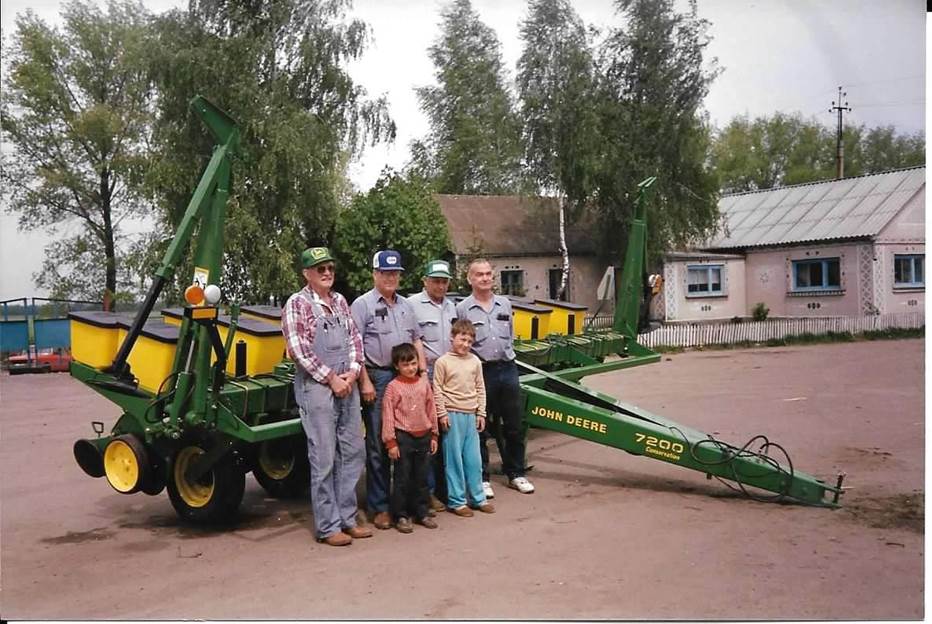
I caught up
with four retired, life-long U.S. farmers in the idyllic, bucolic village of
Slobodyshche in Zhytomyr oblast -- with nesting storks dotting the landscape,
just like those depicted in Ukrainian art and literature. The four farmers from
Iowa were engaged in a joint venture project, helping with the sowing of corn
at the Korolova collective farm. Their names (transcribed here from the
Cyrillic version in my 1993 reports to English) were -- Art Swers, Walt Napp,
Bob Buts, and Francis Kestner.
73-year-old Art Swers explained why these American farmers decided to take part
in the project: “We are farmers and in America farmers help one another.
We understood that Ukrainian farmers need help so we came with the goal
of helping.” He said he wishes the
Ukrainian farmers success in privatizing the land. “We know how much bounty
private farms have created in our country and so we hope to see that they will
have private farms here” in Ukraine, he said.
Francis Kestner, who along with his wife owns a 300-hectare farm in Iowa,
stated that he was happy to be here to lend a hand to his Ukrainian colleagues.
He was most impressed with the small, private garden plots that
Ukrainian farmers have: “I am most in awe of how much work the villagers of the
Zhytomyr region put into their [small] private plots.
If they can produce a good garden, they can have a good harvest out in
the field.”
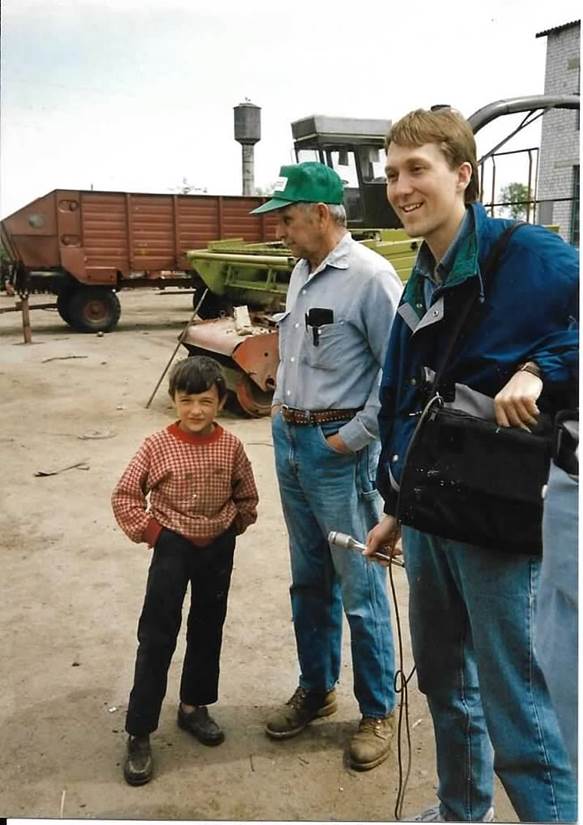
For the local
Ukrainian farmers, it was their first-ever interaction with Americans.
They appreciated the idea of private land ownership but were concerned
about where they could get funding for the necessary farming equipment.
Although not much had yet changed in farming in the first year or so of
independence, one Ukrainian villager pointed out with satisfaction that “we
have plenty to eat.”
KHARKIV
ENTHUSIAST FOR AMERICAN KNOW-HOW
Back in Kharkiv, I had met with Anatoliy Yarokh, an energetic enthusiast for
spreading American know how. He
had traveled to the United States on an exchange visit and, subsequently, got a
job working for an exchange program which placed experienced businesspersons
from the U.S. at eastern Ukrainian enterprises and other entities.
International “communication is important, because Ukrainians in Kharkiv
and, generally, in Ukraine, are obtaining a lot of information, which was
unavailable earlier. They
communicate with real people, who share their experience and develop contacts,
which leads to commercial and business ties,” he said.
These exchanges, noted the native of Zaporizhia, impact people’s
psychology and their view of the Western world.
Furthermore, “many European countries, and especially America, set a
good example for us. Personally, I
would like to continue on my current path [of building contacts with the
world]… and to be useful to Ukraine.”
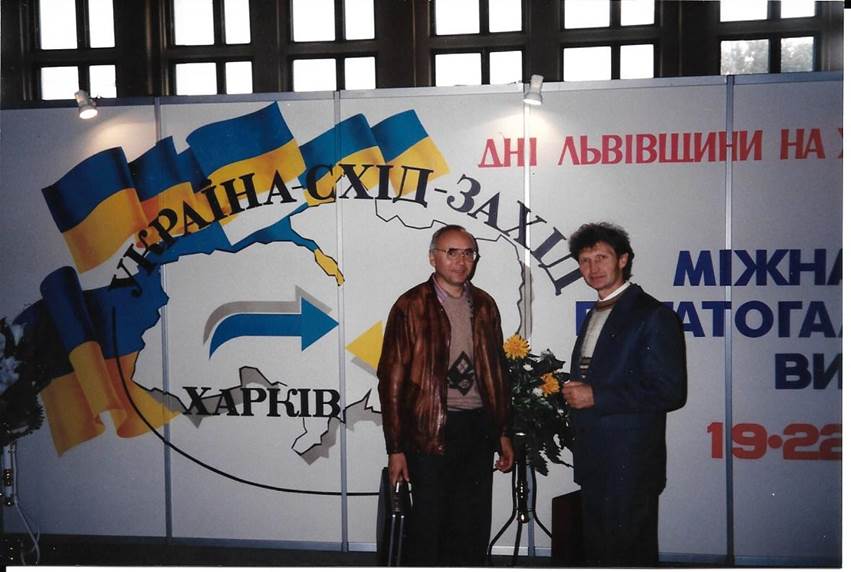
Anatoliy Yarokh (right) and VOA colleague Viacheslav Novikov in Kharkiv.
(1995)
HISTORY AND
HEROES IN POLTAVA AND KANIV
History, they say, is written from the point of view of the victors. A painful
example of this is the history of the Battle of Poltava, which plunged most of
Ukraine into stifling occupation by Russia for over 250 years. The victor, in
this case, being Peter the Great and Russia -- with Ukrainian hetman Ivan
Mazepa and his kozak forces, then allied with Sweden’s Charles XII,
suffering defeat. Henceforth,
Russian and Soviet historiography demonized the Ukrainian leader,
characterizing him as a traitor.
According to the deputy director of the Museum of the Battle of Poltava,
Oleksandr Yanovych, Soviet imperialist policy required that the museum present
hetman Mazepa in a negative interpretation and not as a fighter for Ukrainian
independence. But with the
dissolution of the USSR, it become possible, said Yanovych, to present Mazepa
and the 1709 battle truthfully, namely, that “the battle of Poltava was a
tragedy for the Ukrainian people.
Ukraine totally lost its independence. [It] was the first push towards the
Russification of Ukraine.”
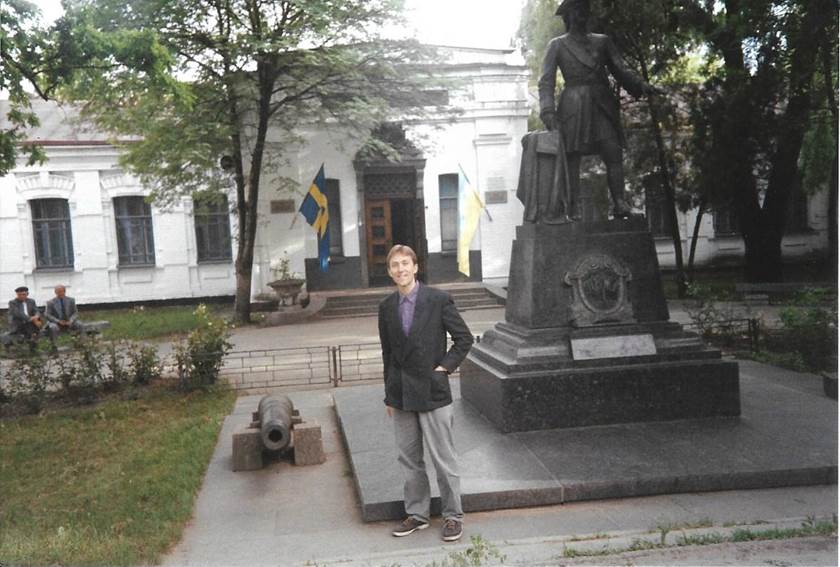
From my visit to the museum in Poltava.
In our 1993 interview, Oleksandr Yanovych commented that Mazepa cannot be
considered a traitor to his people.
Quite the opposite. Through
his political and philanthropic activities, he did a lot to build up Ukrainian
statehood. And Yanovych explained
that the characterization of the 1654 Treaty of Pereyaslav as a “reunification”
of the Ukrainian and Russian peoples is false and only was promoted that way to
help quash Ukrainian independence.
Yanovych said that Ukraine regaining its independence less than two years ago
impacted the museum in a major way --- it brought stunning changes to the work
of the museum: “In the life of the Ukrainian people a new age has arrived –
Ukraine has become independent.
Now we have the opportunity not only to think about ourselves, but to openly
speak, to bring historical truth to the people without twisting facts, without
the politization of history.
Currently there is a big interest in our museum.”
Still, despite the new positive assessments of Mazepa’s historic role which
were taking place at the Poltava museum, as of the spring of 1993, Mazepa still
had not achieved the level of respect in his homeland of other Ukrainian
leaders or historic figures. In
the center of Kyiv there were streets named after Shevchenko, Khmelnytsky and
Hrushevsky but for some reason Mazepa had not been honored in the same way.
Liudmyla Shendryk, a staff scholar at the museum,
emphasized that Mazepa is deserving of more attention and respect from
his compatriots: “When talking about Mazepa, he should be honored at the level
of Bohdan Khmelnytsky, because as a political figure he is in no way inferior
[when comparing the two].
Historians have written quite a lot about Mazepa and if you study them all, you
can see that he was truly a person who fought for Ukrainian independence. And
he is a person who played a big role in Ukraine and he deserves to be honored
at a national level.”
In responding
to why Mazepa had not reached such a respected status in the view of most
Ukrainians or most then-current Ukrainian politicians, she said that they
probably do not know Ukrainian history very well and that history needs to be
studied.
With Ukrainian spring in full bloom, toward the latter part of my assignment I
traveled to Kaniv for a commemoration of Taras Shevchenko’s reburial there on
May 22, 1861. His initial internment took place in St. Petersburg but his final
resting place is a gravesite located on bluffs overlooking the Dnipro River.
My conversations with those that gathered there for the anniversary
confirmed that Shevchenko remained the most popular and revered Ukrainian. I
heard from his devotees about why they admire him so much.
Valentyna Shcherbyna of Kaniv exclaimed that she has deep reverence for Taras
Shevchenko because in his poetry he portrayed the suffering of the Ukrainian
nation, which is relevant today, more than 130 years after his death. She
respects Shevchenko “for his difficult life, because ours is no better,” and
added: “We have trust in him. We share our pain with him.
Today we are with him. But
we believe that if Shevchenko was resurrected from being forgotten, Ukraine
will also be resurrected.”
Meanwhile, Vasyl Tsybulko, also a local resident, said he respects Shevchenko
as one of those who helped establish Ukrainian statehood: “You can say that one
of the founders of our country is Shevchenko, Taras Hryhorovych.”
As for contemporary leaders, he gave credit to President Kravchuk for
being a figure that can unify the very different regions of Ukraine.
But Oles Cherednychenko, a music student at the kobzar school of Strytivtsi in
Kyiv region, lamented that newly independent Ukraine was short on heroes and
leaders of Shevchenko’s caliber: “We lack having people that will fight less
for fame and instead would fight for accomplishing things.“
By studying history, music and folklore, Oles felt he was making a
contribution to carrying on Shevchenko’s legacy.
NEW THOUGHT
LEADERS
As Ukraine marks the 30th anniversary of independence, it has no
shortage of insightful political analysts, commentators and journalists to help
shape the country’s narratives and media environment. Among them are such names
as Yaroslav Hrytsak, Oleksiy Haran, Mykola Riabchuk and Olha Herasymiuk.
As it turns out, I had interviewed them for our Voice of America
broadcasts in 1993, at a time when they were in the early stages of their
careers.
At his apartment along one of Lviv’s cobblestone streets, historian Yaroslav
Hrytsak explained the transformation going on in Ukrainian historiography: In
Soviet times, “the treatment of the historic process was to show that the
Ukrainian people came into existence simply
to unite with Russia, to go with Russia to the October Revolution and then to
live together in the Soviet Union.”
Now, said Hrytsak, Ukraine faces “a very complicated process of creating
a political nation” and historians are called to completely reexamine “What is
the meaning of Ukrainian history? …What is Ukraine? What is a Ukrainian?”
Oleksiy Haran, a young professor at the University of Kyiv-Mohyla Academy and
author of Multiparty Ukraine helped explain to our audience the
political lay of the land in Ukraine.
After 70 years of one-party rule, he was quite enthusiastic about the
genuine democratic political competition between political groups, interests
and parties. Voters could choose from an array of democratically oriented
parties, including the Republican Party, The People’s Movement (Rukh), the
Congress of National-Democratic Forces, the Democratic Party of Ukraine, New
Ukraine and the Party of the Democratic Rebirth of Ukraine. But if they want
real power, they will need to cooperate more in the future to overcome
the dominance of the old-guard socialists in Parliament, Haran argued.
In an interview, literary critic Mykola Riabchuk talked about the crucial role
that civil society organizations play in pressuring the government to be
responsive to the demands of the country’s citizens.
Much of Ukraine has a weak tradition of civil society organizations –
especially under the severe constraints of Soviet rule -- but glasnost
brought a new energy to the sector and, interestingly, the Union of Writers of
Ukraine took on the role of an opposition organization, noted Riabchuk.
With the collapse of the USSR, independent political parties, media
outlets, civil society organizations, unions and businesses emerged.
Currently, Olha Herasymiuk is the chair of the National Council of Television
and Radio Broadcasting of Ukraine. Back in
1993, she was a journalist at Respublika newspaper. Just prior to our
interview she had participated in an East European forum titled A Free Press
Today and she shared this observation: “It turns out that we are all facing
the same situation – the euphoria from victory over the regime that existed has
passed. The euphoria from the
victory of democracy has passed.”
Herasymiuk explained that the old bureaucracy, corruption and the mafia have
made a comeback and journalists in the entire region are talking about how to
respond to this challenge, including through joint efforts.
Although there is freedom to write, there are immense financial
difficulties. Ms. Herasymiuk had
earlier participated in an exchange program where she was able to learn about
the U.S. media ecosystem.
Commenting on a year and a half of independent statehood she said: “To be truly
independent you need to have dignity” and “we are not filling it [independence]
with the necessary content.” It
was more of “a gift” than “something we fought for,” she mused.
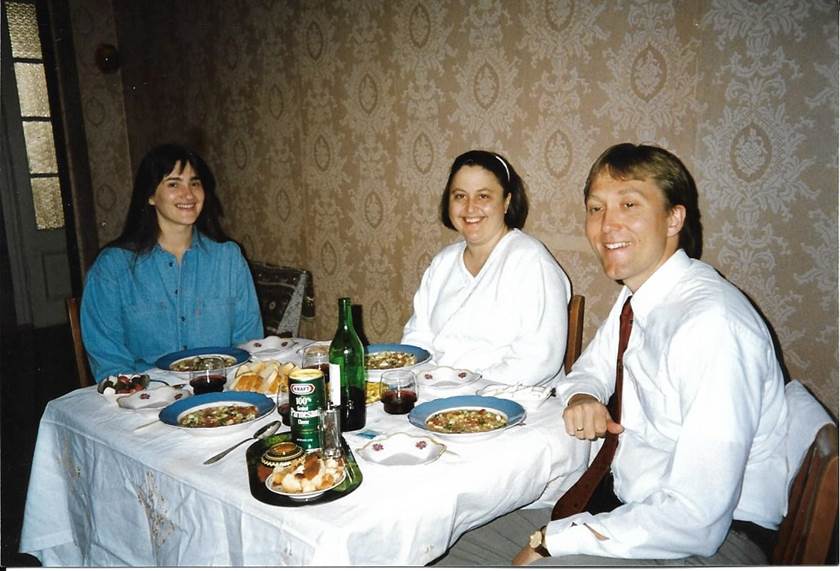
With Olha Herasymiuk (left) and Irena Yarosevych.
During my visit to Lviv, I also interviewed Oleksandr Kryvenko, the dynamic
editor-in-chief of the Post-Postup newspaper.
The city was a major player in the independence movement, but after the
dissolution of the USSR it was suffering from a loss of a sense of mission and
from a bit of “brain drain,” with so many of its leading figures having moved
to Kyiv where all the action and decision making takes place.
So Kryvenko and I talked about what new role Lviv might find for itself.
One of his main complaints: There has not been enough emphasis from “democrats”
who came to power on promoting younger, market-oriented cadres.
Sadly, Oleksandr Kryvenko will not be present for the 30th
anniversary of independence, since he tragically died in a car crash in 2003.
CULTURE AND
FAITH
On the cultural scene, I had the opportunity to interview Ivan Malkovych, who
in 1992 founded the first Ukrainian-language private children's book publishing
business in independent Ukraine -- A-BA-BA-HA-LA-MA-HA.
He established the company because he felt there was a scarcity of good
Ukrainian language books for children.
Publishing books is a labor of love for the poet, who was responsible
for ordering difficult to find paper, loading trucks, recruiting illustrators,
editing the books, handling the accounting -- in a nutshell, overseeing every
step of the production and distribution of the books.
His aim was for the books to be read and shared in a family circle --
the place where he believes the rebirth of the Ukrainian language will take
root. “I want to publish original and nice books [and] … if I publish good
books, if the TV journalist makes good broadcasts, if mass media and
entertainment have positive Ukrainian figures -- children will be drawn” to the
Ukrainian language, he said.
In a clear
validation of Malkovych’s mission, by the time it marked its first anniversary,
his publishing company’s board book titled “Ukrainian Alphabet” [Ukrayinska
abetka] had sold over 70,000 copies -- an impressive feat for this
pioneering creative and entrepreneurial effort.
More recently, A-BA-BA-HA-LA-MA-HA gained fame for publishing the Harry
Potter series in Ukrainian.
Even with independence, things were not always going smoothly for the Ukrainian
cultural revival. Just weeks
before the planned May 29th opening of the Chervona Ruta
music festival in Donetsk, local authorities were still holding off with
approval of the event. With
regional competitions in full swing, I caught up with Eduard Drach -- an
awardee from the inaugural Chervona Ruta festival in 1989 -- at his concert in
Kyiv. He did not hide his dismay about the situation but, fortunately, the
problem was resolved and the festival successfully took place in Donetsk.
As an added treat that evening, music artists Mariya Burmaka and Vasyl
Zhdankin joined Drach on stage.
Highlighting newly won religious freedoms in Ukraine, I was able to capture on
tape the Easter-week sounds and sentiments of parishioners at the Ukrainian
Greek Catholic Sviato-Mykolayivska parish on Palm (Willow) Sunday and at
the Ukrainian Autocephalous Orthodox Tserkva sviatoho arkhstratyha Mykhayila
on Easter Sunday. The former was located in the Podil district of the capital,
while the latter stood on the grounds of the Ukrainian folklife museum in
Pyrohovo on the southern outskirts of Kyiv.
DIASPORA
During my interview with Oleh Skydan, an editor at Narodna hazeta and
deputy head of the secretariat of the Ukrainian World Coordinating Council
(UWCC), he talked about new opportunities to work with the diaspora since
independence: “Currently a lot of people from Canada and the United States are
coming to Ukraine, working here, they are teaching in educational institutions
or working as advisers or experts.
That is, they are trying to share their experience and, figuratively speaking,
laying their brick in the foundation of our statehood.”
On a recent trip to Britain, Skydan was so impressed with the
activities, institutions and dedication of the diaspora there that he decided
to join the UWCC. “That example of
service to Ukraine which we see in the Ukrainian diaspora of the West, it is
inspiring [and] inspires one to work here in Ukraine,” he said.
One of the Ukrainian-Americans who, along with her husband, came to work in
Ukraine, was Lida Kucher Shevchik from Detroit, Michigan.
She worked on U.S.-Ukraine academic exchanges. Being a witness to such
historic changes in the land of her parents was very special: “I have various
impressions. But my best
impressions are related to the opportunity I have to live and be here in
Ukraine, after having studied about Ukraine and studied the Ukrainian language
and culture [while growing up] in the USA.
It is very good to be here and in this difficult time to work and be of
assistance to a certain degree, in our own way.”
Interestingly, the first U.S. Ambassador to Ukraine was Ukrainian-American
Roman Popadiuk. I ended up covering his talk at the newly revived University of
Kyiv-Mohyla Academy. Thanks to the
Voice of America, highlights of his address could be heard by students
throughout Ukraine.
UKRAINIAN
VOICES
I made dozens of friends during my 1993 reporting assignment, and I’m grateful
for the kindness they showed in helping me figure out how to navigate the
nuances of life in newly independent Ukraine, especially from a journalistic
perspective. At one point we all
gathered together in my small apartment on Tarasivska Street in Kyiv for an
evening of good cheer in honor of my wife Sonia’s birthday.
It was a celebration like no other with Chervona Ruta music festival
laureate Mariya Burmaka singing beautiful songs from her repertoire -- the most
intimate concert experience imaginable. Somehow the legacy of Ukraine’s
decades-long isolation totally melted away that evening and it became
impossible to remember or imagine a Holos Ameryky radio broadcast
without the voices of people living in Ukraine.
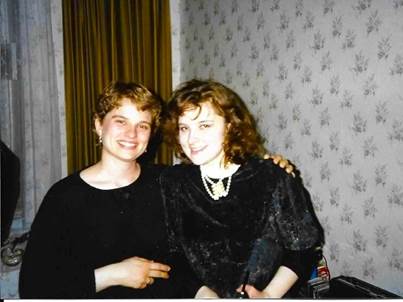
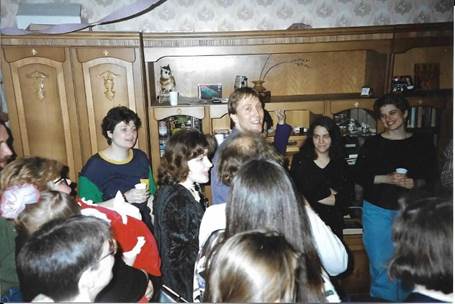
My wife, Sonia (left), with Mariya Burmaka, who sang for our gathering of
friends and colleagues.
RETURN
REPORTING TRIPS
In that first decade of Ukrainian independence, I had two additional extended
reporting assignments in Ukraine.
In 1995, I was a visiting reporter at Radio Ukraine International (RUI) as part
of an exchange program. Besides my
collaborations with the RUI team, my reports and interviews for VOA included: a
report on official and NGO responses to a French nuclear test, an interview
with Natalie Jaresko of the Western NIS Enterprise Fund, an interview with MP
Oleksandr Yemets, an interview with State Property Fund Chairman Yuriy
Yekhanurov, an interview with Tom Garrett of the International Republican
Institute (IRI), a report about the Ukrainian Publisher’s Forum in Lviv, a
profile of the Lviv Institute of Management, discussions with journalists from
UT-2 (Volodymyr Hutsul), Vikna TV (Mykola Kanishevsky), ICTV (Yuriy Kolisnyk)
and Vysokyy Zamok, an interview with Artur Bilous of the New Ukraine Party, a
report on the Ukrainian cultural revival in Kharkiv, my second interview with
Kharkiv Mayor Yevhen Kushnariov and a report on the Ukraine:
East-West Trade Exhibit in the city, a visit to two Ukrainian-language
schools in Kharkiv, an interview with U.S. Commercial Attache Andrew Bihun, and
report on a SABIT program participants’ reunion at America House.
In 1998, I had a two-month-long reporting assignment in Ukraine which included
an opportunity to sit in on focus group interviews in which listeners analyzed
and commented on our programming.
Although they were interested in American life, it was clear that they felt VOA
was not covering events in Ukraine comprehensively enough.
One participant said that over the past seven years “we’ve changed a lot, we
wish VOA would change with us.”
This group talked about the major improvements in Ukrainian media and asked
that VOA take a more serious interest in covering and analyzing events in
Ukraine. “Listening to VOA you’d think there is no news coming out of Ukraine,”
said one focus group participant. Another added: “I’d like VOA to talk more
about Europe and to analyze the situation in Ukraine.”
My reporting
on the Ukrainian economy, business, foreign investment and reforms in 1998
featured Oleksandra Kuzhel of the State Committee on Business Development,
Viktor Zubaniuk – a business magazine editor, Mark Kalenak of the U.S. Chamber
of Commerce and Petro Vanat of the Zaporizhia Union of Industrialists.
My reporting on the political situation featured MPs Borys Bezpaly and
Oleksandr Yemets of the generally pro-presidential People’s Democratic Party,
Vitaly Kononov of the Green Party, Oleksandr Slobodan of Rukh, Serhiy Sobolev
of the Reforms and Order Party, Petro Symonenko of the Communist Party, Oleh
Bilous of the Hromada Party and others.
One of the reports that I filed was a roundup of parliamentary reaction
to the president’s state-of-the nation speech.
Another highlight was a scene setter from Zaporizhia on the eve of a
visit of President Kuchma, featuring the governor of the province and a local
journalist. Also, I was fortunate
to interview former President Leonid Kravchuk on the seventh anniversary of the
referendum on Ukrainian independence.
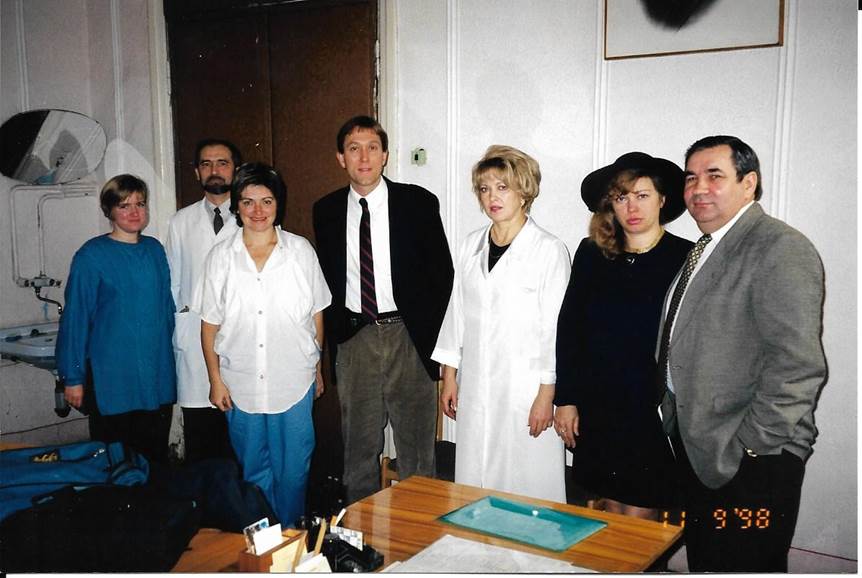
At a hospital in Dnipropetrovsk.
I devoted a significant amount of my reporting in the fall of 1998 to
U.S.-Ukraine relations, including the visit of Stephen Sestanovich, the U.S.
Ambassador-at-Large for the NIS, who helped launch a new U.S.-Ukrainian-Polish
cooperation initiative. I
interviewed U.S. Ambassador Steven Pifer on a number of issues and also covered
his talk at Kyiv University. Other
reporting highlights included George Soros’ visit to Ukraine, an interview with
Taras Kuzio of the NATO information office in Kyiv on the Sea Breeze exercises
(which were strongly opposed by leftist parties in parliament) and several
USAID projects in Ukraine (including NGO development, medical and disaster
assistance, land privatization and legal support of independent media).
I also reported on the tourism industry and how government regulations have
been hurting its growth and on NGOs that provide social services to disabled
children. That assignment also
included my first ever trip to Dnipropetrovsk, today known simply as Dnipro.
It yielded a report on a hospital which received medical equipment from
the U.S.-based Children of Chornobyl Relief and Development Fund,
an interview with Anatoliy Bolebrukh – head of the history department at
Dnipropetrovsk State University, and an interview with Yevheniy Borodin – a
former U.S. exchange program participant who worked on youth issues in local
government.
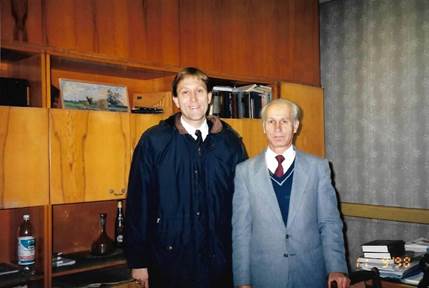
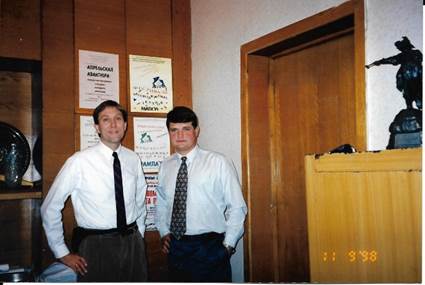
With Anatoliy Bolebrukh (right photo) and Yevheniy Borodin in Dnipropetrovsk.
In order to keep pace with all the important news coming out of Ukraine,
counter Russian and oligarch-controlled media, stay relevant, respond to
listener preferences and grow our audience, by the end of 1999 we hired four
local Ukrainian reporters in Kyiv to comprehensively cover the huge number of
consequential stories -- and the rotation of our American staff in Kyiv was
phased out. A decade of Ukrainian independence and ever-increasing U.S.
engagement with Ukraine meant that coverage of U.S.-Ukraine relations by our
Washington team and reporting from Ukraine would be a major pillar of our
Holos Ameryky radio programming mix. VOA had always been about “sharing
America’s story” but by the arrival of the new millennium that story included a
burgeoning and multi-faceted U.S.-Ukraine relationship.
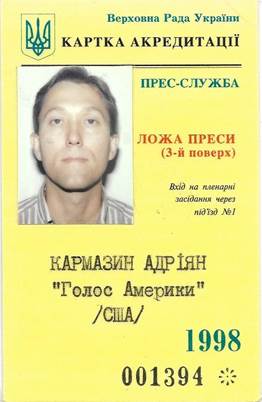
-May 16, 2021
![]()